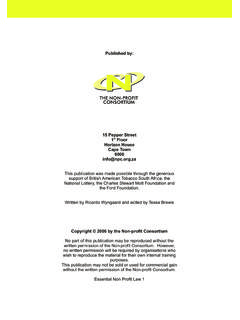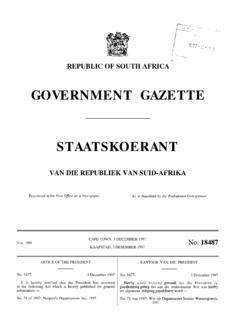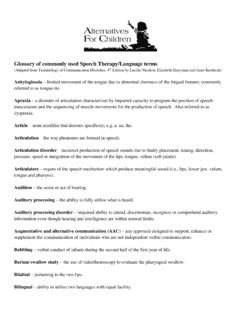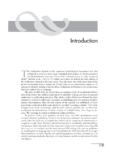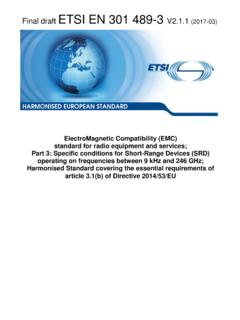Transcription of Final Terms of Reference for communication …
1 Terms of Reference for hiring a communication Specialist to develop and implement a communication Strategy for the project: Sustainable use of natural resources to improve resilience in South Africa: A grassroots women s initiative project Project Background Oxfam has been developing and supporting advocacy work on climate change policy and campaigning over several years especially on adaptation, resilience, finance, climate negotiations through partners in South Africa. As in other developing countries, people living in poverty in South Africa are particularly vulnerable to the impacts of climate change. Around 70% of the country s poorest households live on small-scale farms or manage small household gardens to supplement their food security.
2 These communities are dependent on natural resources for their livelihood and climate change is constantly threatening it, limiting their ability to grow food for subsistence or livelihoods. Some of the consequences of climate change already being experienced by small-scale food producers include: unpredictable rainfall; dried land causing rainwater to run off; flash-flooding washing away crops and soil; extremely hot days or cold frosts destroying crops; dramatic changes in the seasons for fishing; and changes on seasonal employment contracting opportunities. Women are often more vulnerable because they have a greater reliance on natural resources; fewer physical resources / assets to sell or make money with; fewer financial resources; less access to markets that give a good price for their goods; and less powerful social and human resources (influence in decision-making, education levels).
3 However, it is these roles in communities as well as vulnerability that make women key actors in this climate change adaptation and mitigation project. All the available evidence suggests that climate change will place increasing pressure on South Africa s ability to grow food. Hence, the need to ensure small-scale food producers are supported to adapt and increase their resilience to climatic shocks is essential. This will hopefully ensure that these communities are not pushed further into poverty but can pro-actively play a role in feeding their households and communities under an increasingly difficult agricultural production environment. Oxfam is working with two partners, GenderCC and Earthlife Africa Johannesburg, on a project funded by the European Commission in South Africa.
4 The project will involve supplying and training women to use alternative renewable energy in the form of solar PV or biogas digesters and water harvesting tools which will provide inputs for food gardens for which tools and training will also be provided. The Water harvesters will be selected to fit the individual environments of each community will catch rain water that can be used for household use and irrigation. Soil compost, produced from the re-use of waste in biogas digesters or composting, will help improve productivity. Renewable energy, through the biogas digesters or solar power units, will enable women to spend less time and scarce funds to access energy for heating, storing food, cooking and household tasks allowing their families to continue household tasks at home after night fall, including studying for children.
5 This will allow more time to spend on farming and income generation activities. The project will be managed and owned by the women involved, who will be trained on how to install and then manage the water harvesting, biogas digester or solar unit and the food gardens. The techniques will be locally appropriate, locally owned and easy to continue beyond the end of this action to build in longer term sustainability and ensure this continues to be a grassroots women s initiative . Rationale Part of the project objectives is to raise awareness of the benefits of natural resource use to improve climate resilience at community level. Oxfam would like to develop a communication strategy that will help to generate information and promote a simplified understanding of how natural resource management (water and organic waste), sustainable energy (PV and biogas) and small farms can improve the livelihoods of women living in poverty.
6 The strategy should include the voices and stories of the women who will lead this project and help tell an honest but encouraging story of how South Africa can move towards more sustainable local development. Our ultimate aim is that policy makers see the benefits and scale up this type of project over the coming years. Scope of Work (a) Purpose and objectives Oxfam in cooperation with partners seek to recruit a communication expert(s) to develop and design a comprehensive communication strategy. The overall objective of the communications strategy will be to generate awareness and discourse around sustainable alternatives to increasing food security and incomes of grassroots communities amongst grassroots communities and policy makers.
7 The communications specialist is required to: To develop a multi-media communication strategy that will identify specific objectives for raising awareness amongst the target audiences. To create work plan with clear deliverable outcomes, indicators and tools for the implementation of the strategy. To implement the strategy over a two year period, working closely with the project partners and grassroots communities. Ensure a focus on community-based participatory methodologies to ensure accessibility to vulnerable communities. (b) Audience and use Policy makers and opinion formers General public, particularly vulnerable / grassroots communities (who may benefit from learning from similar projects) (c) Deliverable outputs It should be noted that Oxfam works on strict deliverables and milestones that on which payments will be made: (i) Mapping and analysis of communications approaches done by other comparable projects and establish the existing learning s.
8 (ii) Analysis of target audiences and how to reach them; (iii) Establish specific objectives for the communication strategy; (iv) Produce a 3 year strategy to deliver the objectives with clear deliverables, milestones, media to be used and responsibilities (v) Produce Key messages (vi) Implement the strategy across the 3 year period (vii) Establishing a procedure and chronology of how to implement the communication strategy activities by Oxfam team. (viii) Establish and implement tools for evaluation of the communication strategy. (viii) Produce regular reports on communications activities (e) Timeframe and Budget The communications strategy should begin in July and run for 30 months, with a minimum of 180 days of work.
9 Skills and Experience To be considered for this role you must: have a strong track record of development and delivery of creative internal and external communications; have experience in change communications across complex projects; be able to turn complex language into appropriate messaging for a range of audiences and have experience delivering communications using a variety of channels aiming at those 'hard to reach' target groups; Have strong interpersonal skills and experience of working with a range of stakeholders from Oxfam, partners and grassroots communities; Have the gravitas and credibility to engage with target communities and audiences; Experience in producing communication products in a variety of formats and languages To apply: The consultant should prepare a detailed proposal outlining their approach, with a budget and timeline, examples of relevant work and your CV / credentials to: by 6 June 2014.
10
